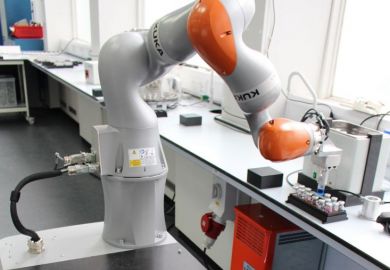A US government commission on artificial intelligence has called for the launch of a new university in a bid to increase the number of technology graduates working for the federal administration.
The proposed US Digital Service Academy (USDSA) would be an accredited, degree-awarding university that trains future public servants in digital skills, according to recommendations from the National Security Commission on Artificial Intelligence (NSCAI), which is chaired by former Google CEO Eric Schmidt.
Under the proposals the university would be an independent entity within the federal government, modelled on the five US military service academies, which educate and train commissioned officers for the armed forces.
Students at the USDSA, which would work closely with the private sector and existing academic institutions, would not pay for tuition, or room and board, and would be obliged to work in government for a minimum of five years once they graduate. The commission proposed an initial cohort of 500 undergraduates and the academy would recruit tenure-track academics and part-time faculty from universities, industry and government.
The core curriculum would include US history, government and law as well as composition, mathematics, computer science, and the physical and biological sciences. Students would then choose to major in a particular technical field such as artificial intelligence, electrical science and engineering, computer science, molecular biology, cybersecurity, physics and data science. They would also have the opportunity to blend those subjects with humanities and social science disciplines, such as political science, economics, ethics and philosophy, or history, according to the recommendations.
Alongside the undergraduate degree programmes, students would participate in summer internships with industry and government agencies.
The goal is for all students to graduate with at least a “secret clearance” – the second of three levels of security clearance in the US. During the fourth year of study the academy would match student preferences to the government’s needs to assign graduates job roles across the federal government.
The commission recommended that Congress appropriate $40 million (£31 million) over two years to pay for the academy’s initial administrative costs.
José-Marie Griffiths, president of Dakota State University and one of the NSCAI commissioners, told Times Higher Education that “many government agencies and departments don’t have the talent they need to modernise at the speed of technological change” and “the demand for talent is increasing dramatically”. Many graduates from existing US universities work in private industry, rather than government, she added.
“The talent scarcity is such that the private sector is able to move very nimbly and very quickly and also can pay salaries that tend to be higher than the government can,” she said. “The US government and military are large bureaucracies and they lumber forward – they’re not as agile as they could be.”
The academy would have to compete with the likes of Stanford University and the Massachusetts Institute of Technology for students, but Dr Griffiths said she thought that the guarantee of a job after graduating would be “in this day and age…quite attractive”.
Rafael Reif, president of MIT, said that the new university would be “an intriguing new competitor in the race for talent – but it will also become a source of new collaborators and collaborations”.
“The quality of American higher education springs from freewheeling competition and mutual inspiration; we make each other better. I look forward to seeing how the Digital Service Academy takes its place in this stimulating ecosystem,” he said.
But Philip Altbach, research professor and founding director of the Center for International Higher Education at Boston College, said that $40 million was “insufficient” to set up the university and recommended putting the funding into the community college sector, which “already does a good job of providing basic training and advanced training for people in the tech industry”.
He added that “given the current state of the federal government and the current administration” there is a risk that the institution would “become politicised”.
Register to continue
Why register?
- Registration is free and only takes a moment
- Once registered, you can read 3 articles a month
- Sign up for our newsletter
Subscribe
Or subscribe for unlimited access to:
- Unlimited access to news, views, insights & reviews
- Digital editions
- Digital access to THE’s university and college rankings analysis
Already registered or a current subscriber?








